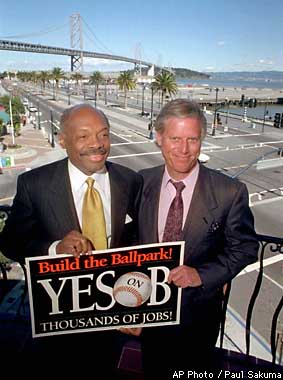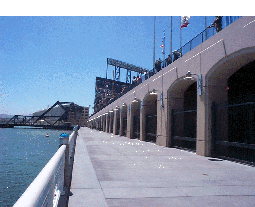Political
Economy |
Pac Bell Park opened its doors for its first official Giants game on April 11, 2000, finally ending nearly two decades of battling to get the Giants a new stadium to keep the Giants in San Francisco and make them a profitable team. Since 1960, the Giants shared the notoriously cold and windy Candlestick Park with the NFL's 49ers since 1960. The Giants were unable to fill the 70, 207-seat stadium, costing owners millions of dollars. In 1984, Bob Lurie put the team up for sale prompting a series of four proposals from 1987-1992 to build a new stadium that were all squashed at the polls. In 1992, Peter Magowan kept the Giants in San Francisco by buying the franchise from Lurie, who planned to sell to Tampa Bay, Florida. However, the Giants were still an unprofitable team and needed the new stadium. In December 1995, the owners unveiled their plan to construct a completely, privately financed stadium that would seat 42,000 fans in the downtown waterfront property of San Francisco. The waterfront property was already under the process of being revitalized after voters decided in 1990 to support growth in the area. The area was littered with empty warehouses and shipyards unprofitable to the city. The encouragement of development, through increased city spending to improve sidewalks and transportation brought the area office buildings, restaurants, various condominiums and apartments. The proposed $255 million stadium would move to the southern end of the property at China Basin, on real estate owned by CalTrans and The Port of San Francisco. The Port of San Francisco would by the land from CalTrans and the Giants' would lease the land from the Port of San Francisco at a fair market rate. The Giants would get a $10 million in returns on their property taxes to maintain the outside area around the park. Bank loans would provide $145 million. The sale of naming rights, advertising rights, and lifetime seat licensees would garner $100 million. With a booming economy and dot com success, the possibility of obtaining private investment was realistic. Multiple forms of public transportation would connect the entire Bay Area to the ballpark and encourage people away from the use of cars that would cause congestion in the area. |
Giants'
owners methodically formed alliances with potential opposition to the
development. Landlords in the neighborhood, who might oppose the proposition
because of the increased congestion, were won over through trips to Baltimore
and Denver to see the benefits reaped by cities with new downtown ballparks.
Politicians took little persuading. Mayor Willie Brown pushed
for the development of the ballpark because of the additional tax revenues
and positive effect it would have on capital investment on the waterfront.
However, it was the promise of not using any public funds to build the
stadium that won public support for the development project. |
However, not everyone was convinced. The opposition to the park was led by the San Franciscans for Planning Priorities '96. They believed that the new ballpark would displace small businesses that would lose business when cars flooded the parking spots before games. They believed that the congestion and presence of the ballpark would lessen the quality of life for surrounding residents. However, their biggest complaint was that the Giants and the politicians were not being forthright with the hidden costs the privately financed stadium would concur on the city. Money would be needed to clean the construction site and to build the infrastructure to support the ballpark. The Giants' avoided confronting these questions by getting the ballpark proposal, Proposition B, on the March 1996 ballot rather than the November 1996 ballot. The campaigning of the growth machines proved to be successful. The proposition passed and the development project was not delayed by any government agencies. Chase Securities financed the loan while Pacific Bell bought the naming rights. By December 1997, construction had begun. |
 |
 |
The
ballpark that now resides in China Basin is considered one of the best
ballparks in the country, but the hidden costs that the Giants' promised
would not exist are uncovering themselves. The city must budget $1.1
million to patrol the park on game days and regulate traffic. Some
politicians want to place this cost on the Port of San Francisco who made
the deal with the Giants. However, they are already disgruntled by the
$10 million dollars they had to spend to buy the land and relocating tenants.
The privately financed ballpark is costing public funds. Even
the owners are seeing profits dwindle as they are working to break even
rather than profit. The novelty of opening day seems to have
worn off and the economy has worsened since 2000. Stands are empty
again. However, renewed interest in the Giants after reaching the
World Series in 2002 may help revenues in the next year. |
As
a result of the presence of the ballpark, the consumer base in the area
has shifted. Thousands of fans flood the area during the baseball
season, taking over local restaurants and corner stores replacing regulars
who worked in the shipyards and surrounding areas. However, there is no
proof that the ballpark has created anymore wealth for the city. Rather,
it seems as though there has been a displacement in the distribution of
wealth rather than a creation of wealth. It is a new, trendy place to
be and many of the new patrons are people with money to spend. San Francisco now boasts a state of the art baseball stadium to add to the list of traits that lure people there. This asset improves the city's reputation and makes it more appealing to capital investments to the city in the future. At the same time, San Francisco becomes an envied city by other cities competing to attract investment. The use of private funds to build the stadium has already irritated cities and team owners who cannot convince the public to support stadiums that are publicly financed because everyone believes that privately financed stadiums are the answer, even if the downturn in the economy deters investment. However, the frustration to other organizations is no matter to Giants' fans who can finally rest assured that their Giants won't be looking to move anytime soon. |